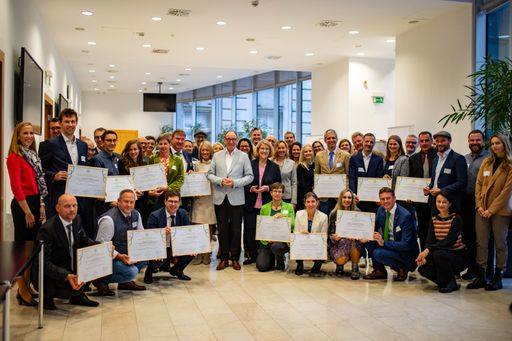A total of 18 health facilities were honored today by Health Minister Johannes Rauch for their flagship climate protection projects. For the second time, health and care facilities were able to submit their climate protection projects in six different categories – from buildings and energy to awareness-raising and communication. “With their commitment, the institutions show that a climate-friendly healthcare system is possible and set an example for the entire healthcare sector. They take on the important task of protecting the climate and at the same time strengthening our health. Because climate protection is health protection,” emphasized Health Minister Johannes Rauch at the award ceremony. ***
The health sector must also make its contribution to climate protection. It is responsible for around seven percent of CO2 emissions in Austria. An important basis for this contribution is the “Climate Neutral Healthcare Strategy” presented in July 2024.
“It is particularly important to bring exemplary health facilities to the fore. We can learn from them, bring together knowledge and pass it on. With the award we are creating awareness and motivating others to invest in climate protection and thus in securing the future,” said Health Minister Johannes Rauch.
The target group of the best practice award is hospitals, senior citizens’ and nursing facilities, primary care units, outpatient clinics, pharmacies and doctors’ practices. Innovative lighthouse projects were sought in six categories: buildings and energy; green space; Mobility; Nutrition; Resource and waste management and sustainable procurement as well as communication and awareness raising.
The head of the climate neutrality and sustainable transformation department at Gesundheit Österreich GmbH, Ruperta Lichtenecker, is enthusiastic about the projects submitted this year: “The projects impressively demonstrate how climate protection can be implemented in conjunction with health promotion in health facilities and how many benefits are associated with it are. In this way, energy and resources are saved and costs are reduced, a health-promoting environment is created for patients and employees, a contribution is made to mitigating the climate crisis and security of supply in health and care facilities is strengthened.”
A commission of experts from the areas of climate and health evaluated the submitted projects. The following criteria were used for the evaluation: contribution to climate protection or the extent of greenhouse gas reductions achieved, the innovative character and long-term impact of the measures taken, reproducibility and willingness to transfer knowledge, and the contribution to health promotion.
In the Buildings and Energy category The Hospital of the Teutonic Order Friesach, the Haiho Pharmacy Haidershofen, the Althea Rothenthurm and the Schwaz District Hospital were able to convince. In the latter, the energy requirement was reduced by more than 50% through the implementation of a comprehensive energy strategy, with a lively transfer of knowledge taking place at various information events.
In the Green spaces category The winners were Silberhoamat Weidachhof, Steiermärkische Krankenanstaltengesellschaft mbH, LKH Graz II and ATOMOS Klinik Währing.
The ATOMOS Klinik Währing impressively demonstrated that greening measures, for example in the form of roof gardens, are also possible in urban environments and should therefore serve as a model for further projects in a similar form.
Die Mobility category The Ordensklinikum Linz GmbH – Sisters of Mercy – Elisabethinen, the Tirol Kliniken GmbH decided in favor, as did the pediatrician ordinations Mag. Dr. Veit Krösslhuber and Dr. Andreas Totschnig, who rewards patients who travel to the surgery in an environmentally friendly way by public transport, bike or on foot with a voucher for a local bakery that bakes organically and with regional ingredients.
In the Nutrition category The BVAEB health facility Josefhof received an award.
With its project, the Josefhof implements a health-promoting and climate-friendly diet for residents aged 60+. Little by little, residents are encouraged and trained to eat a balanced and increasingly plant-based diet.
Die Communication and awareness raising category decided the Medius Center for Health, the Hospital of the Brothers of Mercy St. Veit an der Glan, the ordination of Dr. Thomas Quinton and the Brothers of Mercy Austria for themselves. At the Merciful Brothers of St. Veit an der Glan, one employee per area is defined as an environmental coach, who goes through the key points of a checklist with categories from the areas of climate and environment every day and carries out a documented inspection every month. The completed checklists are then compiled and evaluated so that further measures can then be developed and implemented across departments.
In the Waste/resource management and procurement category The Feldkirch State Hospital and Speising Orthopedic Hospital scored highly. In the latter, the no longer used but still high-quality and functional hospital utensils are continuously collected and passed on to charitable institutions in Austria and Ukraine, which, in the spirit of sustainability, leads to a reduction in waste and an extension of the lifespan of the products.
Furthermore, Upper Austrian Health Holding received a special prize from the jury for the project “High-quality recycling of plastic in the healthcare system – Hospi Cycle conception project”. As part of the project, a new waste concept was developed in order to separate and recycle hospital-specific plastic waste in the future. Thanks to the new collection concept for these plastic items, the waste can be collected according to type and thus contribute to increasing the recycling rate.
